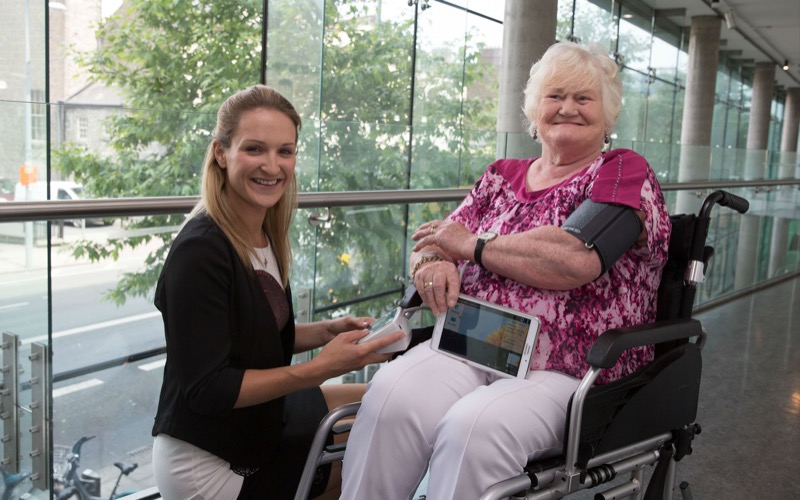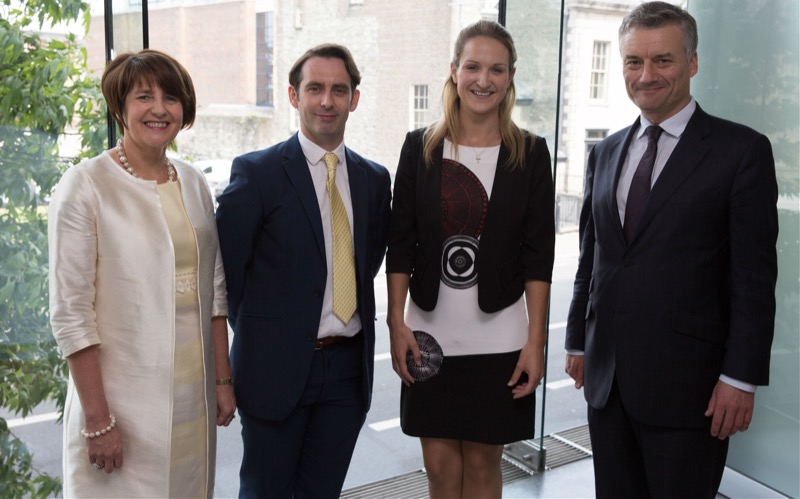New Health Technology Project led by Trinity to improve Older People’s Lives
Posted on: 08 June 2016
A new, cutting edge digital health technology project led by Trinity College Dublin will enable older people with multiple chronic diseases to self-manage their conditions and to be cared for in their own homes. Minister of State for Mental Health and Older People, Helen McEntee launched the new digital health research programme ‘ProACT’ that has been awarded €4.87 million under the European Union’s (EU) Horizon 2020 Research and Innovation programme. Led by the Trinity Centre for Practice and Healthcare Innovation (TCPHI), the project brings together an EU consortium of research institutions, SMEs, health service providers, EU networks and multinational ICT companies IBM and Philips.
‘ProACT’ when complete will be the first cloud based, digital solution of its kind in Ireland and Europe to specifically support home based integrated care and management for older adults (aged 65 and over) with multiple chronic health conditions. The technologies will be focused on facilitating behavioural and lifestyle changes for older people living at home and will link with their care support network. It aims to enable older individuals to live independently in their community for as long as possible.

Commenting on its significance, the newly appointed Minister McEntee said: “Supporting older people and the challenges they face in later years is a priority for us in Government. ‘ProACT’ is just one example of how this can be achieved by providing a unified approach to integrated care, centred on the patient at home with support from caregivers, social care workers, community based GPs, pharmacists and hospital based clinicians. I am delighted to be launching this project today as it clearly will help people to remain in their own homes in the community as they grow older.”
Provost and President, Dr Patrick Prendergast of Trinity College said: “Addressing the challenges of ageing is a priority for Trinity researchers. ‘ProACT’ is a prime example of how important this research is for the benefit of all in society. It brings together clinical and health research, data solutions and ICT that will lead to the development of new technologies with the overall aim of improving older people’s lives. Joined by international partners and industry, it will deliver cutting edge innovation that will make a real difference for all of us as we grow older.”
The first phase of the research programme will target integrated care for diabetes, chronic heart disease, congestive heart failure, chronic obstructive pulmonary disease (COPD) and age related cognitive decline. It has the potential to be further developed to address all chronic disease conditions, across all age groups.
Through the new ‘ProACT’ system a range of new and existing care applications, sensors and healthcare technology devices will be linked. Customised interfaces will allow patients and their network of carers, GPs, pharmacists and hospital-based clinicians to access the system via their tablet, smartphone or computer, in order to input and access relevant information from one centralised location for the support of home-based, digital integrated healthcare.
Currently, 50 million patients in Europe suffer from two or more chronic conditions (or multimorbidity). More than 70% of healthcare costs are spent on the management of chronic diseases with an overall expenditure in the EU of €700 billion annually. In Ireland, there are approximately 16,000 people aged 65 and over with multimorbidity. The four main types of chronic diseases are cardiovascular disease (e.g. congestive heart failure), cancers, chronic respiratory diseases (e.g. COPD) and diabetes.
Commenting on the current situation for patients, Dr John Dinsmore, lead academic and coordinator of the ProACT project said:“Care for patients with two or more chronic diseases is frequently repetitive and inefficient, involving multiple appointments that are often inconvenient and burdensome. Patients sometimes receive confusing and conflicting advice that could also be potentially unsafe, for example due to medication interactions. This poorly integrated and coordinated care has a range of negative consequences for the health and quality of life of patients and their carers, but also at a broader societal level in terms of healthcare resources."
With ProACT we will aim to improve patient engagement by empowering the patient to proactively manage their conditions and to promote a sense of ownership over their health and their care. The system will also seek to improve training and support, particularly for informal caregivers within the home, in order to help reinforce positive health management and lifestyle changes for patients aged over 65.”
By developing new proactive, home based healthcare models that use digital technologies, it is possible to challenge the single disease framework of chronic disease management and provide new flexible, patient-centred solutions to support the management multiple conditions. To achieve this ‘ProACT’ will develop a new cloud-based, open application programming interface (API) to integrate new and existing technologies to support individuals with multiple chronic conditions. Technologies the system will support include home based sensors and wearable technology to track and provide personalised clinical and non-clinical feedback to patients.
The ProACT research programme will take place across two primary trial sites in Ireland and Belgium, with a system transferability trial planned in Italy in 2018. It will take over three years to complete and from 2019 future development work could see the system rolled out across a range of disease conditions and age groups.
Commenting on their involvement in ProACT, industry partners, said:
Lab Director, IBM Research – Ireland, Eleni Pratsini said: “We welcome ProACT as a unique opportunity to tap into the multidisciplinary expertise of service providers, industry players and academic partners. The team at IBM Research – Ireland will investigate how cognitive, cloud-based analytics can be extended to provide a consolidated view of the individual helping to drive behavioural change and enable better outcomes.”
Senior Director, Sybo Dijkstra, Philips UK said: “Integrated health systems and connected technologies can improve the quality of care for patients and have a positive impact on the health of populations. We are, therefore, delighted to be part of this research programme which seeks to help improve patient self-management and care collaboration via new technologies and care delivery models.”

